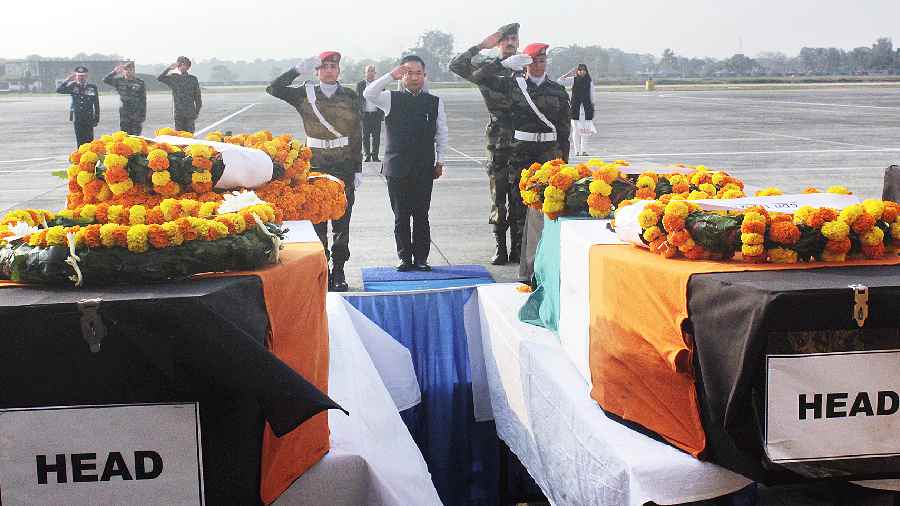The accident that claimed 16 soldiers of the Indian armed forces on Friday has again brought to light the condition of NH10, the principal highway that connects Sikkim with the rest of the country, and the roads in the Himalayan state that lead upto certain areas along the India-China border.
On Friday, an army truck carrying 20 army men towards the international border in north Sikkim skidded off a slope and fell on a gorge while negotiating a sharp turn. Sixteen occupants of the truck died.
“The exact reason behind the accident is not known.... But there is little doubt that the conditions of some of the roads in the state and the main national highway connecting the state with the rest of the country are deplorable,” said a source in the Sikkim government.
In recent months, a number of fatal accidents have been reported from Sikkim in which army personnel, tourists and local residents have lost their lives.
“It is important to improve the road conditions in Sikkim, especially in the northern parts of the state. Roads in Mangan district are important because of regular mobilisations by the Indian army here as it is on the China border. Also, there are a number of destinations such as Lachen and Lachung where thousands of tourists visit every year,” said a retired army officer based in Siliguri.
In Sikkim, roads are built by the state PWD and the Border Roads Organisation. In recent years, the National Highway Infrastructure Development Corporation Limited (NHIDCL) has also taken up a number of projects, most of which are in the eastern and southern parts of the state.
“However, there are several stretches in the hills where the turns are too sharp,” said a former engineer of Bengal PWD department, who had been associated with road laying in hilly areas Darjeeling and Kalimpong.
According to him, it is necessary to widen the stretches in the areas with sharp turns for smoother and safer traffic. He gave examples of roads in other hilly frontiers like Jammu and Kashmir and Ladakh to buttress his claim.
“Wider roads reduce the risk of accidents, particularly in hilly terrains that witness cave-ins and landslides,” he said, also underlining the importance of regular maintenance of such roads in tough terrains.
Sandip Das, who is associated with tourism and frequently visits Lachen and Lachung, said some work had been done in north Sikkim but a lot more needs to be done.
“In some stretches, conditions have improved but there are many areas where the width of the road needs to be increased. During monsoons and winter months, when there is snowfall, vehicles have to cross these areas in a precarious manner. Widening of stretches, with proper carpeting and consistent maintenance, can improve vehicular movement,” he said.
Cab drivers, who ferry tourists to the different parts of the Himalayan state, said that in and around state capital Gangtok, roads are good. Earlier, the Jawaharlal Nehru Road, which connects Gangtok with Tsomgo Lake and Nathu-la at the India-China border, was too narrow but it has been widened.
“It has been widened now and vehicles can freely move on it. But in the northern parts of the state, the roads are still narrow in many places. If these are improved, the risk factor and travel time would be reduced,” said Dinesh Gurung, a veteran driver based in Rangpo.
He said that only last month, the son of Sandup Lepcha, the minister of roads and bridges in Sikkim, lost his life in an accident in Chungthang of north Sikkim when his vehicle fell into a gorge.
Residents of the state, along with stakeholders of the tourism industry and even tourists who have visited Sikkim, have pointed out the need to widen the NH10, which connects Sevoke, around 20km from here, with Sikkim.
They said that there were a number of landslide-prone zones. During monsoons, traffic in these areas often gets disrupted.
“It is the main highway that connects Sikkim and army vehicles move through it. It is vital to rebuild this highway. Time and again, we have raised the demand,” said Samrat Sanyal, general secretary of the Himalayan Hospitality and Tourism Development Network.
Sources in the Sikkim government said that the ministry of road transport and highways allocated funds for NH10 to widen it and take preventive steps against accidents in landslide-prone zones, and hoped work on this would start soon.











